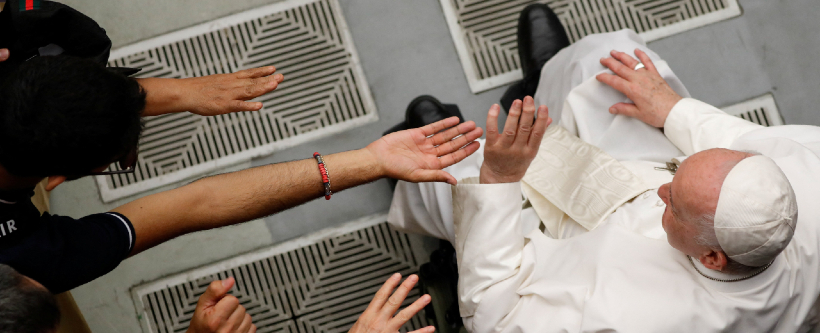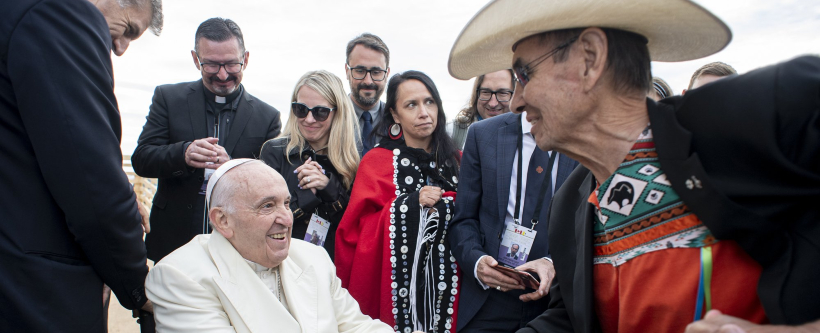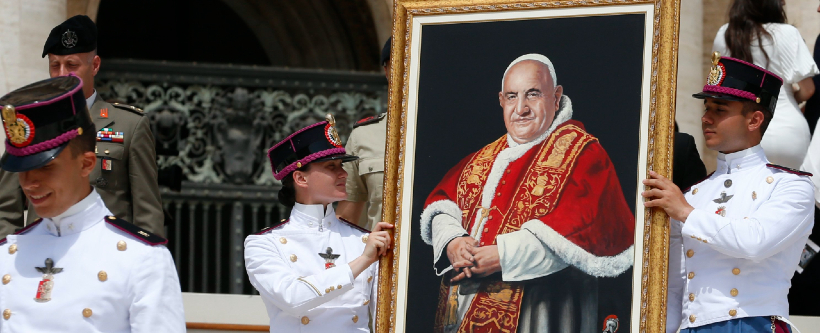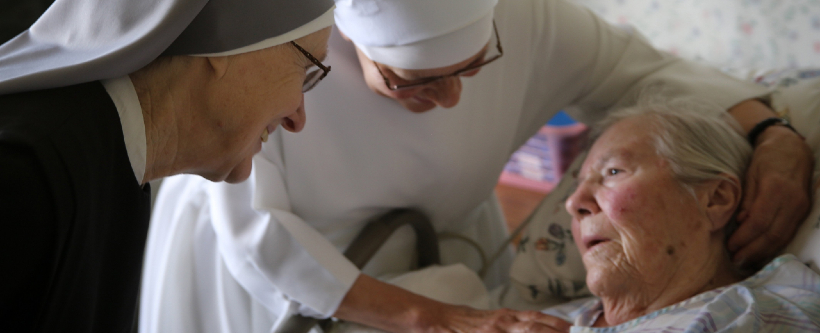
In this last stage of our course of catechesis on the family, we look at the way the family lives the responsibility to communicate the faith, to transmit the faith, be it within or outside itself.
Initially, some evangelical expressions can come to mind that seem to oppose the bonds of the family and the following of Jesus. For instance, those strong words we all know and have heard: “He who loves father or mother more than me is not worthy of me; and he who does not take his cross and follow me is not worthy of me” (Matthew 10:37-38).
Of course, with this Jesus does not want to cancel the Fourth Commandment, which is the first great Commandment directed towards persons. The first three Commandments are in relation to God, this one [now is] in relation to persons. Neither can we think that the Lord, after having worked his miracle for the spouses of Cana, after having consecrated the conjugal bond between man and woman, after having restored sons and daughters to family life, is asking us to be insensitive to these bonds! This isn’t the explanation. On the contrary, when Jesus affirms the primacy of faith in God, he finds no greater significant paragon than family affections. And, on the other hand, these same family bonds, within the experience of faith and love of God, are transformed, are “filled” with greater meaning and are capable of going beyond themselves, to create a wider paternity and maternity, and to receive as brothers and sisters also those that are on the margins of every bond. One day, to one who said to him that his mother and brethren were outside looking for him, Jesus answered, pointing to his disciples: “Here are my mother and my brethren! Whoever does the will of God is my brother and sister, and mother” (Mark 3:34-35).
The wisdom of affections that are not bought and are not sold is the best gift of the family genius. In fact in the family we learn to grow in that atmosphere of wisdom of the affections. Their “grammar” is learned there; otherwise it is very difficult to learn it. And it is precisely this language through which God makes himself understood by all.
The invitation to put family ties in the ambit of obedience of the faith and of the covenant with the Lord does not mortify them; on the contrary, it protects them, it detaches them from egoism, it protects them from degradation, it leads them safely to the life that does not die. The circulation of a family style in human relations is a blessing for peoples: it brings hope on earth. When family affections allow themselves to be converted to witness of the Gospel, they become capable of unthinkable things, which make one touch with the hand the works of God, those works God carries out in history, such as those that Jesus carried out for the men, women and children he met. Only one smile wrung miraculously from the despair of an abandoned child, who begins to live again, explains to us God’s way of acting in the world more than a thousand theological treatises. Just one man and one woman, capable of risking and sacrificing themselves for a child of others, and not only for their own, explains things of love to us that many scientists no longer understand. And where these family affections exist, these gestures of the heart are born which are more eloquent than words. The gesture of love …. this makes one think.
The family that responds to Jesus’ call restores the direction of the world to the covenant of man and woman with God. Think of the development of this testimony today. Let us imagine that the rudder of history (of society, of the economy, of politics) is finally restored to the covenant of man and woman, so that they govern it with their look turned to the coming generation. The subjects of the earth and of the home, of the economy and of work, would sound a very different music!
If, beginning with the Church, we give back leadership to the family that listens to the Word of God and puts it into practice, we will become like the good wine of the Wedding of Cana, we will grow like God’s leaven!
In fact, the family’s covenant with God is called today to oppose the communal desertification of the modern city. But our cities have become like deserts because of lack of love, because of a lack of smiles. So many amusements, so many things to pass time, to make one laugh, but love is lacking. A family’s smile is capable of overcoming this desertification of our cities. And this is the victory of the love of the family. No economic or political engineering is able to substitute this contribution of families. The Babel project builds skyscrapers without life. Instead, God’s Spirit makes deserts flower (cf. Isaiah 32:15). We must come out of the armoured towers and rooms of the elites, to frequent again the homes and open spaces of the multitudes, open to the love of the family.
The communion of charisms – those given to the Sacrament of Marriage and those granted to consecration for the Kingdom of God – is destined to transform the Church into a fully familiar place for the encounter with God. Let us go forward on this path; let us not lose hope. Where there is a family with love, that family is capable of warming the heart of a whole city with its witness of love.
Pray for me, let us pray for one another, that we may become capable of recognizing and upholding God’s visits. The Spirit will bring happy chaos in Christian families, and man’s city will come out of depression!
Greeting in Italian
I give a cordial welcome to the Italian-speaking faithful. I am happy to receive the seminarians taking part in the Campus on the economic support of the Church; the altar boys of the Vicariate of Mede Lomellina; the newly confirmed of the Diocese of Lucca with the Archbishop, Monsignor Castellani and the participants in the Pilgrimage of Consecrated Life of the Diocese of Imola, led by the Bishop, Monsignor Ghirelli.
I greet the Association Oncologic Haemopathic Children; the National Federation of Bell Ringers and the faithful of San Valentino Torio. I hope that this meeting will nourish the faith in all and render charity fruitful.
I give a special greeting to the workers of Smith Bits Saline, accompanied by the Bishop of Volterra, Monsignor Silvani and I hope that the grave occupational trend will find a speedy and equitable solution in respect of the rights of all, especially to rekindle hope in their families and hope in young people.
Finally, I greet young people, the sick and newlyweds. Tomorrow we celebrate the Liturgical Memorial of Saint Gregory the Great. Dear young people, may the moral greatness of this Pope spur you to make courageous choices for the good; may his strength in sickness sustain you, dear sick, in carrying the cross in spiritual union with the heart of Christ; may his bond with the Church help you, dear newlyweds, to unite your family in love.
I greet the English-speaking pilgrims and visitors taking part in today’s Audience, including those from Sweden, the Netherlands, Nigeria, Japan, Malaysia and the United States of America. My particular greeting goes to the Board of the Catholic Extension Society of the United States. Upon all of you, and your families, I invoke an abundance of joy and peace in the Lord Jesus. God bless you all!
In these days the end of World War II is also being remembered in the Far East. I renew my fervent prayer to the Lord of all, through the intercession of the Virgin Mary, that today’s world may no longer experience the horrors and dreadful sufferings of similar tragedies. –But it is experiencing them! –. This is also the permanent yearning of peoples, in particular of those that are victims of various bloody conflicts underway. The persecuted minorities, the persecuted Christians, the madness of destruction, and then those that manufacture and traffic in arms, bloodied arms, arms bathed by the blood of so many innocents. Never more war! This is the heartbroken cry that goes up from our hearts and from the hearts of all men and women of good will to the Prince of Peace.






Facebook Comments